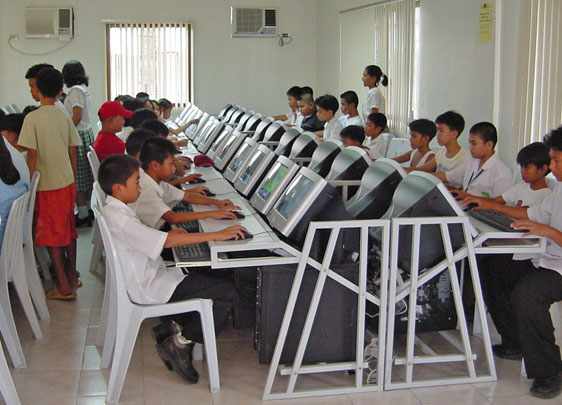Bridging the Digital Divide

Recently I have been bemoaning the lack of broadband access at my grandparents' home in Kuala Lumpur. It seems I have been rather accustomed to having a high-speed internet connection - we had it in Manila, at the parish computer centre, DOM-Net (shown above), in also in the parish in Skipton, at home in Singapore (the wonder of wi-fi)... It makes blogging a breeze and a delight. My grandparents' neighbours have a wi-fi connection which my computer picks up but the signal strength is not good and the connection is erratic. So... last night I was left rather frustrated as I wanted to download some e-mail.
However, as God would have it, I opened the book mentioned above and came across Fact No. 36 (p156 ff): "More than 70% of the World's Population have never heard a dial tone." This came as a surprise to me; I never expected such a high percentage. Here in high-tech Singapore and even Malaysia, one takes for granted the pace and penetration of communications technology. Yesterday, for example, I went to have my Malaysian Identity Card (IC) renewed. By law, the new ICs have to be 'upgraded' before the end of 2005 and they will incorporate a computer chip with our personal information and can also be used as a cash-card and for travel to East Malaysia. It is hoped that one day it will replace our passports! I noted that if I supplied the government with my mobile phone number, they would SMS me to inform me that my IC was ready and could be picked up from their offices. Given this state of technology and the prevalent use of it, I took it somewhat for granted that everyone had some access to the telephone at the very least. Thus, that statistic surprised me somewhat...
It is sad and ironic that communications which aims to bring people together is the very thing that will divide the rich and the poor in the 21st century. Interestingly, the article in the book also claims that the "digital divide" is not just a rich-poor divide. She writes:
"If you're a young wealthy man, highly educated and living in the city in an industrialised country, chances are you're on the right side of the digital divide. If you're older, poorer, female, living in a developing country... you'll be on the other side."
Certainly, I feel there is some truth in that, although my fellow bloggers, many of whom are female, some in a developing country, may have other voices to add to the debate. However, I think that as a broad generalisation there is truth in what Williams writes.
It is humbling for me to realize that even as I moan about not having broadband at home (which I have now, sitting in the family offices), billions of people don't even have access to a basic telephone line. In a huge continent like Africa one would have thought that this would be vital! And yet as governments struggle to provide food, housing, education, health services, the telecommunications network falls to the bottom of the list. And this can be a shame not just for the people but for the nation. For as the industrialised world hurtles forward with e-commerce, digital communications etc they ignore the nations that do not have such infrastruture prepared. That's why Singapore so aggressively promotes itself as a telecommunications hub, an intelligent island-city-state. It's also why Malaysia has established a 'Multi-media Super Corridor'; to boost IT investments.
In the Philippines last year, I had the privilege of assisting the parish of San Lorenzo Ruiz to establish a computer centre as a means to bridging the digital divide. We were aware that in this parish where tens of thousands of students lived, studied, worked and played, there was very little access to a computer and the internet. Even computer science students had no access to an actual computer! The Dagat-dagatan Omni-Media Networking Hub (DOM-Net) was an investment in the future of these students. It aimed to provide computer access and then educate them in the use of the technology for their benefit and education. For the problem we faced was not just to provide the infrastructure but to educate the students in how to use the technology.
Here in the tech-savvy and educated world we take this for granted, turning to the Net for news, opinions, cheap fares, travel maps and directions, books, etc. But in the less educated world, the computer (and the Internet) is just an expensive multi-media toy, like an interactive television. It is seen (and used) as a gaming console! As such education is a great need in bridging the digital divide and this is the greater challenge. We may invest in computers and telephones, broadband and mobiles for the poor but if it is just a means for them to waste time and money on games it is of no use. For ultimately, communication is about not just building social skills but exchanging ideas and challenging young minds to build a better, more educated future. When a farmer in India has a crop-disease and needs help, he can post a question on a forum or look up the matter on the Net, find an answer and improve his harvest. That is a true bridging of the digital divide for it secures a brighter future for the dis-advantaged.







0 Comments:
Post a Comment
<< Home